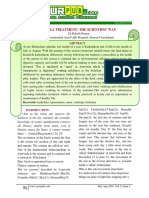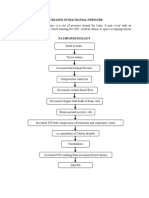Reading Comprehension
Reading Comprehension
Uploaded by
Nurul Akmal LokmanCopyright:
Available Formats
Reading Comprehension
Reading Comprehension
Uploaded by
Nurul Akmal LokmanOriginal Title
Copyright
Available Formats
Share this document
Did you find this document useful?
Is this content inappropriate?
Copyright:
Available Formats
Reading Comprehension
Reading Comprehension
Uploaded by
Nurul Akmal LokmanCopyright:
Available Formats
READING COMPREHENSION
Read the text below and answer all the questions. Your answers must be based on
the information given in the passage.
Ayurveda, an ancient Indian healing system which originated in
Kerala, India more than 6,000 years ago, has only become popular
in Malaysia in the last few years. It is believed to be the most
holistic medical system available as Ayurveda involves studying
and treating the body, mind and spirit of the patient.
II
III
5
Unlike western medicine, Ayurvedic medicine is not used to treat
the symptoms of a disease. If you suffer from sore eyes, for
example, it does not just treat the redness or the swelling of the
eye. Instead, it tries to remove the root cause of the problem,
which will eventually result in permanent relief from soreness
and swelling of the eye. Ayurvedic medicine is mainly made of
herbal preparations which are carefully processed to avoid toxicity.
One of the advantages of Ayurvedic medicine is that it does not
have any side effects like drowsiness, increased heart rate or
weight gain.
10
15
IV
Some people believe that Ayurveda is also a way of life. This is
based on the principle that Ayurveda can improve the health and
well-being of an individual. The body is seen as one that is made
up of both positive and negative elements. Ayurveda helps to get
rid of the negative elements in our body that are the cause of
diseases.
The Ayurvedic way of life stresses the importance of a healthy
diet. This is because it is believed that the food we consume is
converted to nutrients. They are absorbed by the body to nourish
its tissues and also produce energy responsible for our physical,
mental and spiritual well-being. The process is continuous and
when left uninterrupted, a state of equilibrium and good health
exists. When this process is interrupted or when the nutrients are
not absorbed by the body, diseases arise. Apart from removing the
root cause of the disease, Ayurvedic treatment involves correcting
the diet of the patient. For example, processed food which
contains preservatives and additives is removed and replaced by
fresh, unprocessed food.
Although it is safe and natural, many were unaware of the curative
30 aspects of Ayurvedic medicine in the past. However, there is
20
25
30
35
VI
VII
VII
I
evidence to suggest that there is growing public awareness of the
benefits of Ayurveda now. Many Ayurvedic centres have
mushroomed all around the world and Ayurveda is officially
recognised as a form of alternative treatment in some countries.
For example, Sri Lanka is promoting the use of Ayurvedic medicine
in its hospitals and health clinics. Some universities in Nepal are
also offering a number of degree courses in Ayurvedic medicine.
40
There is also increased awareness and acceptance of Ayurveda in
some parts of Europe. Currently, three colleges in the United
Kingdom are offering part-time courses in Ayurvedic medicine.
Russia recently carried out medical experiments that included the
use of Ayurvedic medicine on victims of nuclear disasters.
45
In Malaysia, the first Malaysian Ayurvedic Centre was set up three
years ago in Petaling Jaya, followed by branches in Ipoh and Kuala
Lumpur. These centres are run by qualified physicians and
therapists. They offer curative as well as preventive treatments for
various diseases and these treatments have attracted many
people to the centres.
Despite its growing popularity however, Ayurvedic medicine has
received little attention from the majority of the international
medical community. They claim that Ayurveda is based on
unscientific concepts and cannot manage serious medical
conditions.
Adapted from Sunday Star, September 2003
1. Read each of the following statements and write T if it is TRUE and F if it is
FALSE in the boxes
provided.
(a) Ayurvedic medicine is largely made from herbs and does not
contain any
toxins.
(b) Great importance is placed on what one eats when one follows
the
Ayurvedic way of life.
(c) Most European countries are using Ayurvedic medicine to treat
nuclear
disaster victims.
(d) There are many Ayurvedic centres in Malaysia which have been
operating
for a long time.
(e) Ayurvedic medicine is now widely accepted by all doctors and
medical
practitioners.
2.What do the following words in the passage refer to?
a) which (line 10 )
b) the principle (line 13-14)
c) it (line 28)
d) its (line 33)
e) They (line 46)
3. Below are some words from the passage. Choose a word or a phrase from the box
that has the
same meaning as the word selected from the passage.
lasting
emphasizes
main
from
planted
completed
worries
came
changed
(0) originated (line 1)
(a) root (line 7)
(b) permanent (line 8)
(c) stresses (line 18)
(d) converted (line 19)
came from
Answer the following questions in COMPLETE SENTENCES.
4. According to the writer, Ayurveda does not treat the symptoms of a disease. How
then
does Ayurvedic medicine treat a disease?
5. State one (1) advantage of Ayurvedic medicine.
6. What happens when there are more negative elements than positive ones in the
human
body?
7. Ayurvedic medicine is gaining popularity in Sri Lanka and Nepal. Give two (2)
examples from
the passage which support this idea.
8. State the two (2) types of Ayurvedic treatments available in Malaysia.
9. What is the topic sentence of Paragraph VI?
10. Complete the chart below with information from the passage.
THE IMPORTANCE OF DIET IN AYURVEDA
(a) ___________ diet
Body (b) _________ nutrients.
effectively
Nutrients nourish (c) _________
and produce energy
Unhealthy diet
Body fails to absorb nutrients
Good health exists
(d) __________arise
You might also like
- Check - Unit - 554 - October - Renal - Problems V2 PDFDocument26 pagesCheck - Unit - 554 - October - Renal - Problems V2 PDFdragon660% (1)
- Philippine NLE Board Exam: Community Health Nursing: Question & Answer W/ RationaleDocument19 pagesPhilippine NLE Board Exam: Community Health Nursing: Question & Answer W/ RationaleNicole Ortega100% (2)
- FelicitationDocument1 pageFelicitationankushNo ratings yet
- Vote of ThanksDocument2 pagesVote of ThanksThrishala Ashley NoronhaNo ratings yet
- (Merge) Heartily Welcom - 20230410 - 164535Document13 pages(Merge) Heartily Welcom - 20230410 - 164535Jayashri DasNo ratings yet
- Anchoring Script - ClustersDocument16 pagesAnchoring Script - ClustersmailtorimjhimjainNo ratings yet
- Anchoring Script For A College Convocation FunctionDocument4 pagesAnchoring Script For A College Convocation FunctionAhmed Raza RizviNo ratings yet
- Conduction Script APD-1Document8 pagesConduction Script APD-1Sara TariqNo ratings yet
- ISHKS 2023 - Proposed Scientific ProgrammeDocument15 pagesISHKS 2023 - Proposed Scientific ProgrammeSuvodipBhattacharyaNo ratings yet
- VOTE OF THANKS - My Class Has Got TalentDocument2 pagesVOTE OF THANKS - My Class Has Got TalentGreeshma ReddyNo ratings yet
- Republic Day SpeechDocument3 pagesRepublic Day Speechmonicaedu86% (7)
- Anchoring ScriptDocument4 pagesAnchoring ScriptIqRa JaVedNo ratings yet
- Traditional DayDocument3 pagesTraditional DayAshwinNo ratings yet
- OSPE Guidelines (3rd Yr Session 2022)Document17 pagesOSPE Guidelines (3rd Yr Session 2022)Itni Si Baat HyNo ratings yet
- Republic Day AnchoringDocument4 pagesRepublic Day AnchoringAaniya AsadNo ratings yet
- English Welcome Speech-2 OnamDocument3 pagesEnglish Welcome Speech-2 Onamlakshanakishore03No ratings yet
- Namma Kalvi 12th English Refresher Course Module Answer Key 220233Document17 pagesNamma Kalvi 12th English Refresher Course Module Answer Key 220233biopharmacyNo ratings yet
- Today Is The Big DayDocument9 pagesToday Is The Big DayAnnapurna DangetiNo ratings yet
- 508 - Life Skills MailedDocument104 pages508 - Life Skills MailedCALVARY NIBANDHANA50% (2)
- AnchoringDocument5 pagesAnchoringRambabu KantipudiNo ratings yet
- Anchoring Script FinalDocument6 pagesAnchoring Script FinalAindvi KhannaNo ratings yet
- Validictory AddressDocument15 pagesValidictory Addresssudhakar80No ratings yet
- InvocationDocument2 pagesInvocationSridhar JayaramanNo ratings yet
- The Galaxy of IntellectualsDocument3 pagesThe Galaxy of IntellectualsSindhiya Bala100% (2)
- Annual Day SpeechDocument2 pagesAnnual Day SpeechSarita SehgalNo ratings yet
- ICMR STS 2024 Step-by-Step Guide - MUDocument11 pagesICMR STS 2024 Step-by-Step Guide - MUNandini ThakurNo ratings yet
- Farewell Anchoring FYDocument19 pagesFarewell Anchoring FYsofiya syedNo ratings yet
- AnchoringDocument2 pagesAnchoringFire on keysNo ratings yet
- Health and HygieneDocument24 pagesHealth and HygieneAmruth PnsNo ratings yet
- Compering ScriptDocument4 pagesCompering ScriptOmega0% (1)
- Anchoring Symposium, Event, Confrence - How To Anchor An International Conference - Symposium (Part-4)Document2 pagesAnchoring Symposium, Event, Confrence - How To Anchor An International Conference - Symposium (Part-4)sivaenotesNo ratings yet
- Anchoring Script For The Event of 25TH JanuaryDocument3 pagesAnchoring Script For The Event of 25TH JanuaryTANU SOLANKINo ratings yet
- Renal DialysisDocument14 pagesRenal Dialysisjhodane100% (1)
- Welcome Speech: Arumigam Associate Professor, To Attend This Journal Club PresentationDocument2 pagesWelcome Speech: Arumigam Associate Professor, To Attend This Journal Club PresentationHoney PrasadNo ratings yet
- Mandura Kalpanas - A ReviewDocument32 pagesMandura Kalpanas - A Reviewhrishi8587No ratings yet
- Teacher's Felicitation Script High SchoolDocument4 pagesTeacher's Felicitation Script High SchoolInara ShireenNo ratings yet
- List of New Esevai Address DetailsDocument39 pagesList of New Esevai Address DetailsBalasubramaniyan SNo ratings yet
- Sample - Vote of ThanksDocument1 pageSample - Vote of ThanksAnupNo ratings yet
- Class 4th Lesson 2 Kite SongDocument4 pagesClass 4th Lesson 2 Kite Songtalib ANo ratings yet
- 1) Backstage AnnouncementDocument3 pages1) Backstage AnnouncementRajat RautelaNo ratings yet
- Welcome SpeechDocument4 pagesWelcome SpeechNag28rajNo ratings yet
- Annual Day ReportDocument13 pagesAnnual Day ReportRajiv GomesNo ratings yet
- Vote of Thanks MajeeDocument2 pagesVote of Thanks MajeevaniNo ratings yet
- Anchoring Script For The Teacher's DayDocument3 pagesAnchoring Script For The Teacher's DayDaphilin Kharlyngdoh100% (1)
- Chairman Speech For Golden Jubilee CelebrationDocument2 pagesChairman Speech For Golden Jubilee CelebrationpradeepsatpathyNo ratings yet
- Farewell 2024Document4 pagesFarewell 2024lifelessseNo ratings yet
- Ancient Indian Knowledge System For Holistic Development of School StudentsDocument40 pagesAncient Indian Knowledge System For Holistic Development of School Studentsravi gautamNo ratings yet
- AaDocument4 pagesAaLizaNo ratings yet
- Spicmacay ScriptDocument7 pagesSpicmacay ScriptnavinNo ratings yet
- Ncitie 2020 Anchoring Script-23 May 2020Document9 pagesNcitie 2020 Anchoring Script-23 May 2020shaluNo ratings yet
- Annual DayDocument8 pagesAnnual DayNandini VaittinadaneNo ratings yet
- Script of Invocation Ceremony AnchoringDocument3 pagesScript of Invocation Ceremony AnchoringHarshit Kumar Sharma100% (1)
- Dedicated To My Beloved Parents My LovelyDocument3 pagesDedicated To My Beloved Parents My LovelyKiwiNo ratings yet
- Silver Jubilee ScriptDocument3 pagesSilver Jubilee ScriptAcyuta Raj50% (2)
- Guj DanceDocument3 pagesGuj DanceMaski SrikanthNo ratings yet
- FAIMER FELLOW 2020 - Kavita - Resubmission Final ProjectDocument25 pagesFAIMER FELLOW 2020 - Kavita - Resubmission Final ProjectGreenThumbNo ratings yet
- Value Education PDFDocument1 pageValue Education PDFsuruchi agrawalNo ratings yet
- SPINAL AnaesthesiaDocument54 pagesSPINAL Anaesthesiadarsh bhattiNo ratings yet
- Proposal For Santhigram Franchise Centers in USDocument13 pagesProposal For Santhigram Franchise Centers in USFitzgerald PachecoNo ratings yet
- NOTES On KayachikitsaDocument5 pagesNOTES On KayachikitsaSurendra Saini0% (1)
- MohDocument45 pagesMohDrAnand Nair NNo ratings yet
- PuberphoniaDocument15 pagesPuberphoniaZaini ZulqarnainNo ratings yet
- Hero of ObgDocument2 pagesHero of ObgAnish VeettiyankalNo ratings yet
- Acetazolamide MDDocument13 pagesAcetazolamide MDhunzala shamirNo ratings yet
- A1 AnesiDocument9 pagesA1 AnesiRyan B. IsraelsenNo ratings yet
- SURGERYDocument2 pagesSURGERYpioballesterosNo ratings yet
- PTMC (Cne)Document10 pagesPTMC (Cne)Raly R Munsin60% (5)
- Kebutuhan Alkes Ruang Laboratorium Nama Alat Banyak Harga Satuan JumlahDocument6 pagesKebutuhan Alkes Ruang Laboratorium Nama Alat Banyak Harga Satuan JumlahDewita Wulan PratiwiNo ratings yet
- Therapy RCT Critical Appraisal Worksheet With ExplanationDocument2 pagesTherapy RCT Critical Appraisal Worksheet With ExplanationAdwin AlamsyaputraNo ratings yet
- Hypertensive Disorders in Pregnancy - Pre Eclampsia and Eclampsia PDFDocument30 pagesHypertensive Disorders in Pregnancy - Pre Eclampsia and Eclampsia PDFSylvester J Daka50% (2)
- Nephrotic Syndrome: Practice GapDocument12 pagesNephrotic Syndrome: Practice GapMuhammad Isnaini ZuhriNo ratings yet
- Glutathione in The Human Male: Prostate ProblemsDocument11 pagesGlutathione in The Human Male: Prostate Problemsapi-26034055No ratings yet
- Scholarship Information and RequirementsDocument6 pagesScholarship Information and RequirementsSunni HemingsenNo ratings yet
- MICB4742 Thumb Extensor Tendon RepairDocument4 pagesMICB4742 Thumb Extensor Tendon RepairsenthiljayanthiNo ratings yet
- MENTOR OET Writing Session 10 MR Ming Zang Oet For NursingDocument4 pagesMENTOR OET Writing Session 10 MR Ming Zang Oet For NursingAnjana Varghese67% (3)
- Rajiv Gandhi University of Health Sciences Karnataka, BangaloreDocument22 pagesRajiv Gandhi University of Health Sciences Karnataka, BangaloreSadam HussienNo ratings yet
- Ahs SCN BJH HF Barthel Index of AdlsDocument2 pagesAhs SCN BJH HF Barthel Index of AdlsgarbagepatchNo ratings yet
- Joko Mulyanto Dept. of Public Health and Community Medicine Faculty of Medicine Jenderal Soedirman UniversityDocument29 pagesJoko Mulyanto Dept. of Public Health and Community Medicine Faculty of Medicine Jenderal Soedirman UniversityErica SkinnerNo ratings yet
- 2017 Article 2227Document15 pages2017 Article 2227Sabrina whtNo ratings yet
- Cagayan Valley Center For Health Development: Ethel P. Simeon, MDDocument21 pagesCagayan Valley Center For Health Development: Ethel P. Simeon, MDKeith Clarence BunaganNo ratings yet
- Oral Rehydration TherapyDocument12 pagesOral Rehydration TherapypasambalyrradjohndarNo ratings yet
- Karkidaka DietDocument5 pagesKarkidaka Dietbalamurali_aNo ratings yet
- Increased Intracranial PressureDocument3 pagesIncreased Intracranial PressureElle RosalesNo ratings yet
- Pedia 2 Evaluation of Decury Score SheetDocument1 pagePedia 2 Evaluation of Decury Score SheetJohanna Lindsay CapiliNo ratings yet
- NeoplasiaDocument150 pagesNeoplasiaDavon Richard Walter Van-VeenNo ratings yet
- Sobreviviendo A La Sepsis 2016 PDFDocument74 pagesSobreviviendo A La Sepsis 2016 PDFEsteban Parra Valencia100% (1)
- Nursing Health HistoryDocument9 pagesNursing Health HistoryJajangNo ratings yet
- Extensor Tendon InjuriesDocument35 pagesExtensor Tendon InjuriesPk Nutsuklo100% (1)
























































































